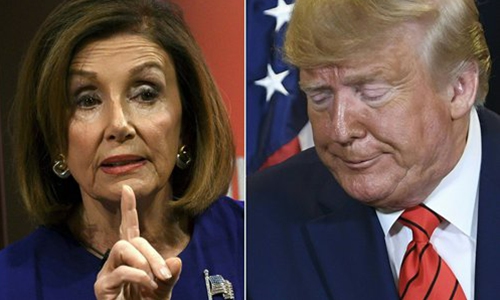HOME >> OPINION
Volatile US politics feeds global instability
By Zhang Tengjun Source:Global Times Published: 2020/1/14 17:53:41

Photo: VCG
The Eurasia Group on January 6 published an article titled "Risk 1: Rigged!: Who governs the US?" listing US domestic politics as the top risk in 2020. Although the most surprising event in 2020 so far has been the killing of Iranian Major-General Qasem Soleimani and the ensuing US-Iran tensions, Middle East situation is only placed as the No.8 global risk. It does not prevent US politics from becoming the biggest risk, especially when considering the potential global and long-term impact of the exacerbating Washington-Tehran row.
The waves of anti-globalization and populist movements, which are marked by Donald Trump being elected US President, cast a shadow of unilateralism and protectionism on the final years of the second decade of the 21st century. World politics is shrinking from an interdependent global village to separate states. This tendency, despite not completely mainstream, is alarming. In the first year of the 2020s, the US remains as the top factor strangling international relations.
It implies that as US president, Trump has broken the common features for which US politics was known. First, US presidential election and the rule of the candidate who comes to power are no longer separate. In previous elections, candidates used to spout diplomatic rhetoric in a bid to win the elections, but when they took office, they exercised discretion in carrying out campaign promises, especially those that were considered controversial. However, Trump sticking to fulfilling his election pledges since taking office has erased the ambiguity of US politics.
Second, the legitimacy and vitality of US democracy are under unprecedented challenges. Within the three years of the Trump administration, there have never been so many voices questioning whether US diplomacy remains influential. Some people condemn Trump as a fascist; some believe the US is becoming a socialist country; while most Americans regard the current US predicament as unacceptable, they are pessimistic and confused about the future of their country.
Two variables - US presidential election and Trump will affect global stability in 2020.
The 2020 US presidential election would be the most influential event in global politics. Who will be elected will directly affect the current and future course of international order.
It is worth paying attention to two elements. One is whether the election would be orderly. It has been widely known that US presidential election is becoming increasingly stigmatized and chaotic.
According to a report of the Pew Research Center, most Democrats and Republicans considered the other side too extreme, unpatriotic and immoral. Partisanship has become the most influential factor in Americans' political values, outranking age, gender, race, educational attainment and religious belief. A growing number of people find it difficult to tolerate people with different political views.
This will lead to the disruption of order during elections. This outcome is also closely related to whether the election results will be accepted by American people. A peaceful transition of government has always been a prominent feature of US democracy that Americans are proud of. However, more and more Americans have started to question it.
Based on a poll carried out by IPSOS in 2019, only 53 percent of the Americans participated in the survey were confident that the 2020 presidential election will be fair. After the Ukrainegate scandal, people who believe the election will be manipulated are increasing. What could possibly worry the Democrats even more is that if Trump fails to win the second term, he is very likely to reject the election result.
Trump is the other wild card. Since 2020 is the last year of his first term, he will maximize his chance of success in the re-election by consolidating his governing achievements, obtaining as much political capital as possible and sparing no effort to attack his opponents. This means that Trump will take more risks in the future. Not only will he probably continue to heat up sensitive topics which have already torn US society apart, such as Medicare and immigration, but he will also cater to white supremacy in cultural identity.
Furthermore, no matter Trump is re-elected or not, Trumpism will not go away easily. Trump's four-year presidency will leave tremendous influence on US politics and society. The right-wing populism he represents is a mixture of white supremacy, racism and xenophobia, which has jolted US political tradition - liberalism. The confrontation and scars because of the social division will not fade away in a short period. On the contrary, US identity recognition and its global role will be greatly impacted by them for a long time.
US presidential election in 2020 is a referendum on the performance of Trump's four-year presidency. Americans will make the judgment by their votes. In November, the election result will tell the world which path the US will take and what it means for world peace and stability.
The author is an assistant research fellow at the China Institute of International Studies. opinion@globaltimes.com.cn
Posted in: VIEWPOINT